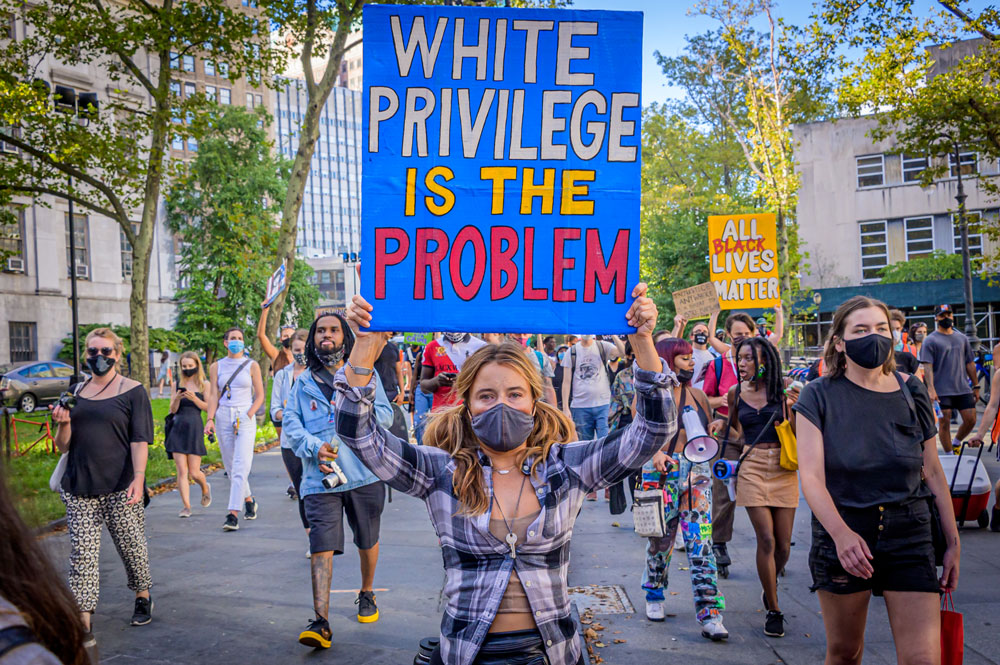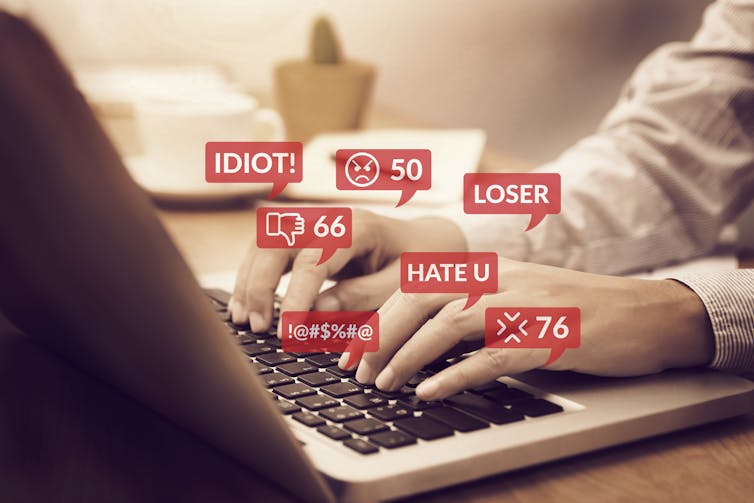
By Christopher Quarles
A wide variety of historical, economic and cultural forces combine to allow a larger percentage of whites to climb up the socioeconomic ladder than Blacks and Hispanics.
Some people call the combined effects of these forces “white privilege.” Though these words are commonly used, research by Lia Bozarth and me has found that use of “white privilege” on social media can actually decrease support for racially progressive policies.
We found that the term can increase online political polarization and lead to lower quality conversations on social media. In particular, the term drives some whites who would otherwise support efforts toward racial equality away from online conversations.
Effects of using ‘white privilege’
In the past decade there has been a push on college campuses to re-title buildings named after people involved with slavery or discrimination.
We used the issue of renaming these buildings as a way to examine how language affects online conversations.
We recruited 924 U.S. residents from Amazon’s Mechanical Turk for our experiment. Half of the research participants were given a social media post containing the following question: “Should colleges rename buildings that were named after people who actively supported racial inequality?”
The other half saw an identical question, except the term “racial inequality” was swapped with “white privilege.” We randomly chose which half received each question.
This random assignment allowed us to show causality – and gave us confidence that the choice of language created the effects we saw.
We asked the participants to respond to their question, and also measured how likely they were to engage with the post in the first place. We then focused on the set of people who were likely to engage with that post online.
The term “white privilege” had two effects.
The first was to decrease the quality of conversation among both whites and non-whites. There were more comments that insulted people, attacked the question itself or simply made no sense.
The second effect was to make the set of responses less supportive of renaming the buildings – and more polarized.
The people who were asked about racial inequality were, on average, very supportive. Those who thought it was a good idea to rename college buildings outnumbered opponents more than 2-to-1.

Getty Images
But the group that was asked about “white privilege” was strongly divided, with just as many opponents as supporters. This shift was caused completely by a change in some whites.
Use of “white privilege” caused 50% of whites who would have been supportive to become ambivalent or hostile. We don’t know which half would have changed their minds. But, due to the experimental design, we can be confident they were there.
In addition, we found that many of the supportive whites just chose to avoid the conversation altogether. While they might have expressed their support for stopping racial inequality, they wouldn’t join a conversation about white privilege.
Because the terms “white privilege” and “racial inequality” have different meanings, we performed an extra analysis to understand what caused these effects.
What we found was consistent with other research suggesting a process called motivated reasoning.
In this experiment, the different meanings of the terms “white privilege” and “racial inequality” didn’t seem to directly affect how people reasoned about renaming buildings.
Instead, we found evidence that the difference in language first affected whether they were supportive of renaming buildings. Only after deciding on an opinion did they find reasons to support it.
Polarization or misunderstanding?
Our results offer insight into one mechanism underlying the polarization and vitriol we see on social media.
Online users who feel strongly about a topic will post about it using strong language, such as “white privilege.”
This language will get people riled up toward one side or another. And the people who might be good mediators – such as supportive whites in our study – are less likely to engage.
The people who remain are then more likely to share extreme views. They create online posts, and the cycle continues.
The result is social media dominated by outrage and extremism, rather than respectful discourse.
Some people I’ve talked to have been genuinely surprised by these results. Others thought they were obvious and not even worth researching.
This is notable, because it suggests that some of the conflict we see online is not caused by malice, but by a lack of understanding.
Social identity dynamics
In our study, the term “white privilege” changed the behavior of some whites. But the psychology behind this change is common to all humans. In fact, the psychological research that first examined this effect focused on Blacks’ performance in school.
The term “white privilege” taps into a deep-seated tendency as old as humanity.
As social creatures, humans are naturally inclined to split the world into “us” and “them.” This can lead to thinking of others – and sometimes ourselves – as a stereotypical member of our group.
Further, we are members of multiple groups simultaneously, according to our age, profession, race, politics and family roles. At any given moment, social cues affect which group is the most forefront in our minds.
This natural tendency to view ourselves through a social identity allowed Germanic tribes who had been warring with each other to band together to drive back invading Romans.
It enabled whites to view Blacks as inferior throughout much of American history and led some Blacks to agree with that view.
It played a role in anti-Muslim sentiment after 9/11.
It’s involved in political partisanship and in protests against authoritarian regimes.
And it’s one reason we feel more comfortable in a group of people like ourselves.
Phrases like “white privilege” play on this reasoning by implying that all whites are similar and have the same negative traits.

Getty Images
Unsurprisingly, the accusation – even subtly implied – that everyone in your race is “bad” can create strong reactions. Some people will just disregard the speaker entirely.
But many others will feel intense visceral emotions such as anger, which can lead us to be more confrontational, or shame, which can cause people to withdraw.
When faced with the term “white privilege,” it’s not surprising that some whites will look less favorably on the speaker’s ideas. And it makes sense that the whites who are more sympathetic will tend to withdraw.
Of course this reaction, which psychologists call “social identity threat,” is not unique to white people.
At some point in their lives, everyone feels unwelcome or devalued because of a group they identify as part of, whether that’s being Black, white, Hispanic, young, old, female, male, Christian or atheist.
A sticky problem
Surveys show that an overwhelming majority of Americans think that everyone should get an equal shot at success, and numerous studies have shown that race is involved in economic opportunity and social mobility. While the data is clear that racial inequality persists in America, its causes are complex and have so far proven intractable.
Meanwhile, social media users spend their time attacking each other, giving the impression of an outraged and polarized citizenry.
Effective communication about personal topics like race can be challenging. The careful use of inclusive language is one way to gather public support – or at least promote meaningful discussion.
Words matter, and our research demonstrates how phrases like “white privilege” affect the way controversial issues on race are perceived.
![]()
Christopher Quarles is a doctoral candidate in Information at the University of Michigan.





























Deb says
Pretending something doesn’t exist won’t make it disappear. Equating “those involved in slavery” with “White privilege” is like saying an apple is a fruit, so all fruits are apples. The writer needs to take another research class to learn how flawed this “experiment” is.
Ben Hogarth says
You mean to say that a generalization based on a polarizing stigma of the entirety of an ethnic group of people frustrates those same people? I’m shocked, truly.
With the theater out of the way, it cannot be stated anymore clearly how disenfranchising broad generalizations of entire groups of people is in “the conversation.” Irrespective of ethnicity, creed, or culture, we can’t continue this way of conducting ourselves in a democratic society. Yes, there exists a degree of broad pedigree among white people over minority ethnic persons, but our society has also made serious attempts to unravel the once unhinged southern (white) “traditions” and bring this nation into a place… where we can all collectively be poor together.
And therein lies the real problem with reducing every discussion today to race. Most of us are suffering – regardless of skin color. The ultra-capitalism that has been unfettered for decades is bringing great frustration and pain for all those who do not fit into at least the top 10% of society – and even that group is quickly shrinking to its own induced cannibalism. The laws that once established equilibrium even among whites exclusively has been lost to greed and mass corruption. And that corruption no longer exists exclusively in the upper echelons of federal and state governments, but in our local elected officials, our local businesses, and our neighbors. The American dream has turned into the American nightmare as the vast majority of people in this country desperately cling to the scraps left on the table for 90% of us. White, black, blue, red – when the bills are due and the debt man comes to collect, no color wins.
But back to the primary point here – the people have been turned on one another. The political rhetoric we see, whether propped up by the left wing or right wing matters not for ALL of it is designed with an “Us vs Them” premise – rather than a “U.S.”
The left clings to the notion that all conservative minded persons are inherently racist, and to a degree, there is still a lot of that element left in society. The right feeds off this culture war narrative and instills a daily fear among conservatives that minorities in this country and in others are “taking their jobs” and “coming for their children.” Again, do you feel any of this is actually helping any of you?
Stop listening to the rhetoric. Turn off the televisions. Throw out the ear pods with the junk podcasts. Pick up a good non-fiction article or book published by reputable sources that don’t have a political narrative in mind. Learn. Educate your kids how to hear EVERY side of an issue (not everything is binary). Uplift yourself and those around you regardless of ethnicity or culture. Get involved in your local politics and learn about local issues that effect your community and the individuals who already are (for better or worse).
And lets get some real work done to change this country around. If we don’t, what’s left will be unrecognizable and most likely a frightful despotism our founders feared above all other things.
Sherry says
Dear Ben,
While I completely agree with your comment. . . every word of it. . . I do not have any confidence at all that very many people will completely disconnect from the “Social Media” and “TV” PROPAGANDA/CONSPIRACY THEORIES/DISINFORMATION that virtually drives their daily lives and opinions.
The author of this piece proposes that while the right winged extremists violently tried to overthrow our government on Jan. 6th, and they continue to erode our democracy at every turn with things like banning books, we should double down on making sure the words in our objections to such actions are “politically correct”.
Perhaps, if the vast majority of our citizens actually would stop basing their life perspectives on brainwashing lies they would be better persuaded by more diplomatic language. Perhaps if classes on “critical thinking” were taught in high school the next generations would have the tools to detach themselves from the pervasive (fascist styled) radicalization that permeates so many media outlets. Unfortunately, the days of the “Age of Reason” are long gone.
If only the weak Democratic party would find “courageous leaders” who are much less focused on consensus building. . . “I don’t know, what do you want to do”? We could “passionately” fight and win the “culture wars” with powerfully positive words that oppose the Republican fear and hate laced rhetoric, while simultaneously stoking the fires to bring back a moral code of ethics as “The American Way.” Words such as:
* HONESTY
* FACTS
* INTEGRITY
* EQUALITY
* JUSTICE
* HONOR
* COURAGE
* LAW AND ORDER
* PATRIOTISM
* COMPASSION
Sherry says
Excuse me Ben. . . I should certainly not make it sound like I believe the majority of our citizens have been brainwashed. . . on the contrary, i actually believe that the vast majority are good people who care about others. My concern is for those who have been radicalized into an angry cult/alternate reality of disinformation. . . and the damage that is causing our society. Please forgive my frustration.
Joy! Peace! and Love!
DaleL says
Let us look at the first sentence of this story: “A wide variety of historical, economic and cultural forces combine to allow a larger percentage of whites to climb up the socioeconomic ladder than Blacks and Hispanics.” Notice that the word “whites” is not capitalized. Whereas, “Blacks” and “Hispanics” are.
If one goes to CNN and reads a story on their website, for example a February 13, 2022 story on the trial of Travis & Gregory McMichael and their neighbor, one finds this: “The federal trial is distinct from the state trial, in which a jury of 11 White people and one Black person found Travis McMichael, his father Gregory McMichael and their neighbor, William “Roddie” Bryan Jr., guilty of Arbery’s murder.” Notice that both “White” and “Black” are capitalized.
I suppose it is a small thing, but I believe that every designation of race, religion, or national origin seem to be capitalized, except for “white” in particularly liberal publications.
As for “White Privilege”, what I have observed that it is more a “Wealth Privilege”. The children of the wealthy (Who are more frequently European American or Asian American.) have an advantage at just about every turn. Programs which help the undereducated and poor, but are race neutral, will win over more people.
A.j says
It does exist. Don’t deny it. Example a white man voted twice during the 2020 election, light sentence. This was up north. Black women in Ala. and I believe in Ken. they were sent to prison for so called voter fraud. White privilege. Many more examples. A white guy rape a drunk woman behind a dumpster, 6 months probation. White folks have it made in this country.
Bill C says
Blah blah blah. White privilege is a fact.
The Geode says
LOL. My black ass lives better than many white (and black) people I know. I make more money than many white (and black) people I know. I have been in the “racist justice system” yet I still persevered. However, if you want to underestimate me because of my color as I continually prove you wrong, I’m not above taking advantage of your white guilt…
Deb says
Hey, Geode. Did you happen to notice the racial divide while you were persevering in the justice system? Glad you are making lots more money than most of us, but can you recognize the extra bs might be too much for some?
I don’t have guilt. I have a brain and a heart and use both to work my old White ass off to try to make the world a better place for kids of every color. I didn’t become a social worker for the paycheck. But I bet I’m richer than you. Enjoy your money.